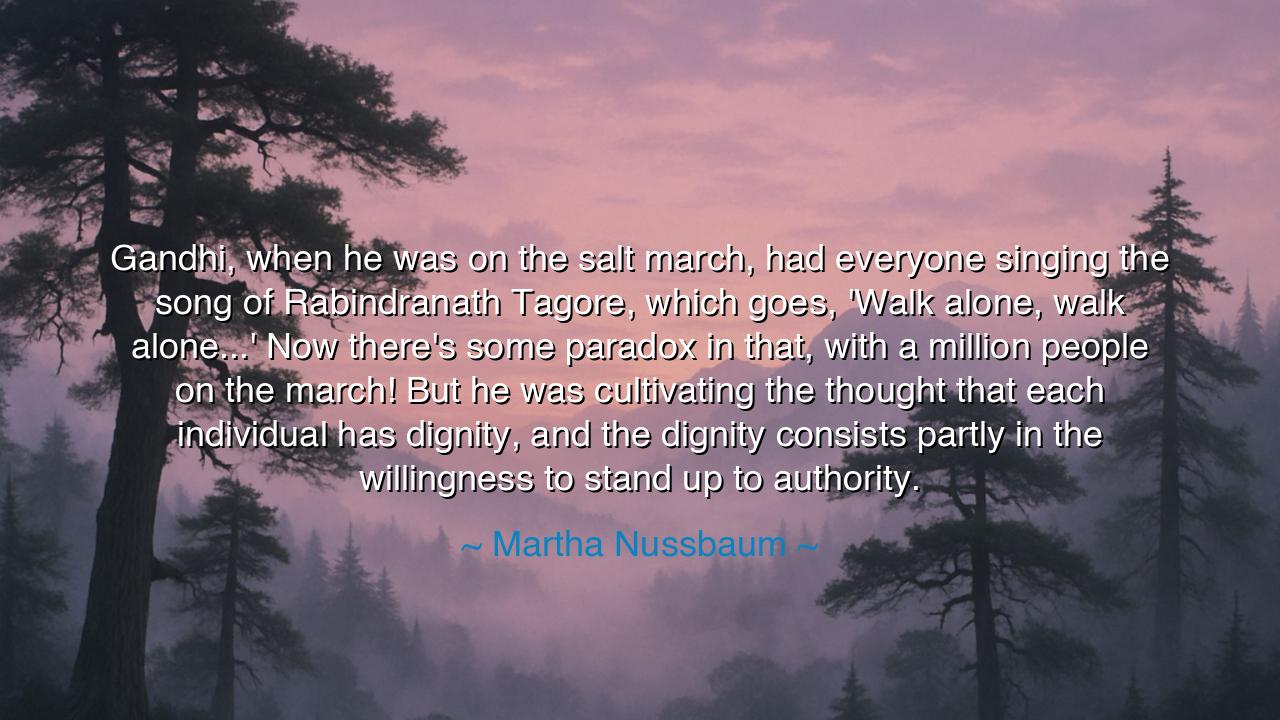
Gandhi, when he was on the salt march, had everyone singing the
Gandhi, when he was on the salt march, had everyone singing the song of Rabindranath Tagore, which goes, 'Walk alone, walk alone...' Now there's some paradox in that, with a million people on the march! But he was cultivating the thought that each individual has dignity, and the dignity consists partly in the willingness to stand up to authority.






In the days when the world trembled under the weight of empires, Mahatma Gandhi rose as a quiet flame, bearing no sword, yet conquering with spirit. When he set forth upon the Salt March, a simple act became a storm of conscience. And as the people walked beside him—farmers, mothers, children, scholars—they sang the song of Rabindranath Tagore: “Walk alone, walk alone…” This hymn was not of solitude, but of courage, of dignity, and of the sovereignty of the soul. For even in the company of millions, Gandhi sought to awaken within each heart the truth that freedom is first born within the individual spirit.
There is a paradox here, as Martha Nussbaum has said: how can one walk alone while surrounded by a sea of humanity? Yet this paradox is the secret of moral strength. To walk alone does not mean to shun others, but to stand unmoved in one’s conscience, even when the crowd turns away. Gandhi knew that authority, whether of empire or mob, can crush only those who yield their inner ground. By teaching each soul to stand firm in dignity, he forged a nation not of subjects, but of free beings—each one a pillar of truth.
Consider the image: the hot dust of India rising around bare feet, the salt wind from the sea calling to them, and voices singing in unison of solitary courage. It was not rebellion they sang of, but self-mastery. For the tyrant governs only where the spirit has surrendered. Gandhi’s teaching was that no law, no empire, could compel the conscience of one who had learned to walk alone in truth. Thus, in every marcher there grew a warrior—unarmed, yet unbreakable.
So too has history given us other solitary souls who walked alone. When Socrates refused to betray his reason before the Athenian court, when Joan of Arc stood before her judges and would not deny her vision, when Nelson Mandela walked out of Robben Island with forgiveness in his heart—each bore the same flame. They were surrounded by enemies or followers, but the truest companion was their inner conviction. The path of the alone is not a road of isolation, but of unyielding clarity.
To walk alone, then, is to listen to the still voice within, even when thunder roars without. It is to act from the seat of moral courage, not from the trembling fear of approval. The multitude that followed Gandhi was mighty not because of numbers, but because each man and woman had begun to awaken this independence of the spirit. The salt they gathered was not merely a protest—it was a sacrament of self-respect, drawn from the sea that had always belonged to them.
And yet, to walk alone does not mean to despise companionship. It means to stand upright among equals, each one rooted in their own truth. When many such souls gather, they do not form a herd, but a fellowship of the free. Their unity is not obedience, but harmony. Gandhi’s march was not the march of slaves behind a leader—it was the convergence of independent spirits, walking as one through the strength of solitude.
The lesson, then, for all who live in these restless ages is this: do not surrender your conscience to power, to fashion, or to the approval of others. Cultivate within yourself the readiness to walk alone when truth demands it. Let your steps be guided by what you know to be just, not by what is comfortable. For only when you have found that steadfastness within can you truly walk with others in freedom.
So rise, O seeker of wisdom, and remember this: the path of dignity begins not in the crowd, but in the heart. When you walk alone in truth, you awaken courage in those who walk beside you. And one day, as with Gandhi and his people, the march of the solitary will become the march of the awakened—a multitude united not by fear, but by the shared light of their own inner freedom.






AAdministratorAdministrator
Welcome, honored guests. Please leave a comment, we will respond soon